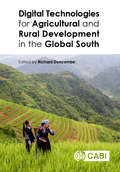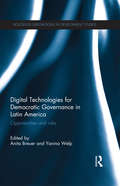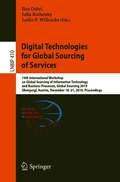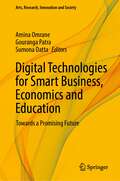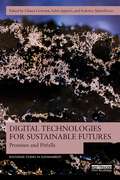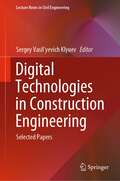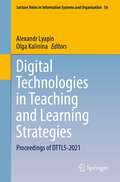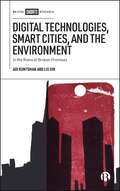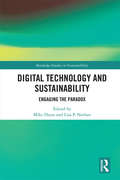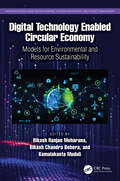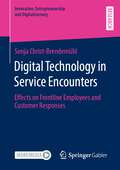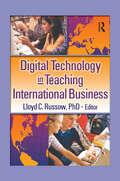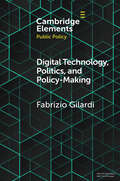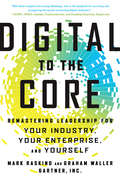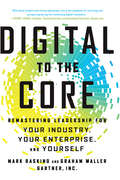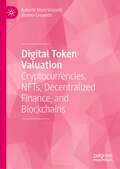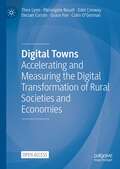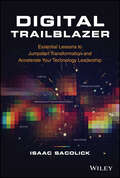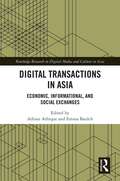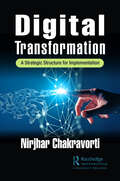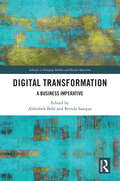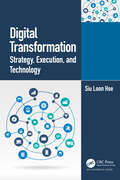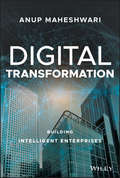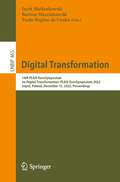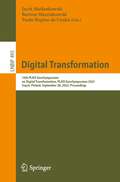- Table View
- List View
Digital Technologies for Agricultural and Rural Development in the Global South
by Stefano Bocchi Fritz Brugger Amanda Caine Amit Chakravarty Chris Clarke Graham Clarkson Andrew Dearden Peter Dorward Richard Duncombe Gordon Gow Charlotte Jordan Linus Kendall Stan Karanasios Sumanth Kumar Luis Emilio Lastra-Gil Alberto Lubatti Mukund Patil Andrea Porro Simone Sala Worlali Senyo Mira Slavova Luka WanjohiThis book shares research and practice on current trends in digital technology for agricultural and rural development in the Global South. Growth of research in this field has been slower than the pace of change for practitioners, particularly in bringing socio-technical views of information technology and agricultural development perspectives together. The contents are therefore structured around three main themes: sharing information and knowledge for agricultural development, information and knowledge intermediaries, and facilitating change in agricultural systems and settings. The book includes: -Views from diverse academic disciplines as well as practitioners with experience of implementing mobile applications and agriculture information systems in differing country contexts. -Case studies from a range of developing countries and information from across the public and private sector. -A set of practitioner guidelines for successful implementation of digital technologies. With contributions reaching beyond just a technological perspective, the book also provides a consideration of social and cultural factors and new forms of organization and institutional change in agricultural and rural settings. An invaluable read for researchers in international development, socio-economics and agriculture, it forms a useful resource for practitioners working in the area.
Digital Technologies for Democratic Governance in Latin America: Opportunities and Risks (Routledge Explorations in Development Studies)
by Yanina Welp Anita BreuerThis book is the first to comprehensively analyse the political and societal impacts of new Information and Communication Technologies (ICT) in a region of the Global South. It evaluates under what conditions some Latin American governments and people have succeeded in taking up the opportunities related to the spread of ICTs, while others are confronted with the pessimist scenario of increased, digitally induced social and democratic cleavages. Specifically, the book examines if and how far the spread and use of new ICT affected central aims of democratic governance such as reducing socio-economic and gender inequality; strengthening citizen participation in political decision making; increasing the transparency of legislative processes; improving administrative processes; providing free access to government data and information; and expanding independent spaces of citizen communication. The country case and cross-country explore a range of bottom-up driven initiatives to reinforce democracy in the region. The book offers researchers and students an interdisciplinary approach to these issues by linking it to established theories of media and politics, political communication, political participation, and governance. Giving voice to researchers native to the region and with direct experience of the region, it uniquely brings together contributions from political scientists, researchers in communication studies and area studies specialists who have a solid record in political activism and international development co-operation.
Digital Technologies for Global Sourcing of Services: 14th International Workshop on Global Sourcing of Information Technology and Business Processes, Global Sourcing 2019, Obergurgl, Austria, December 18–21, 2019, Proceedings (Lecture Notes in Business Information Processing #410)
by Ilan Oshri Julia Kotlarsky Leslie P. WillcocksThis book constitutes revised selected papers from the 14th International Global Sourcing Workshop 2019, held in Obergurgl, Austria, in December 2019. The 10 contributions included were carefully reviewed and selected from a total of 36 submissions.The book offers a review of the key topics in sourcing of services, populated with practical frameworks that serve as a tool kit to students and managers. The range of topics covered in this book is wide and diverse, offering various perspectives on the employment of digital technologies in the context of sourcing services. More specifically the book examines sourcing decisions and management practices around digital platforms, robotic process automation and blockchain, giving specific attention to digital aspects of innovation in sourcing.
Digital Technologies for Smart Business, Economics and Education: Towards a Promising Future (Arts, Research, Innovation and Society)
by Amina Omrane Gouranga Patra Sumona DattaThis book examines the application, challenges and opportunities related to the use of digital technologies in business, economics and education. In this context, the enclosed contributions identify the impact of artificial intelligence, machine learning, internet of things (IOT), computer vision, big data analytics and other advance technology in the area of business, economics and education. The book examines such themes as digital technology for smart business, the progress of the circular economy, the application of IOT in education, the use of drones in agri-business, business forecasting using smart technology, artificial intelligence in healthcare, among others.
Digital Technologies for Sustainable Futures: Promises and Pitfalls (Routledge Studies in Sustainability)
by Chiara Certomà Fabio Iapaolo Federico MartellozzoThis book critically examines the interplay between digitalization and sustainability. Amid escalating environmental crises, some of which are now irreversible, there is a noticeable commitment within both international and domestic policy agendas to employ digital technologies in pursuit of sustainability goals.This collection gathers a multitude of voices interrogating the premise that increased digitalization automatically contributes to greater sustainability. By exploring the planetary links underpinning the global digital economy, the book exposes the extractive logics ingrained within digital capitalism and introduces alternatives like digital degrowth and the circular economy as viable, sustainable paths for the digital era. Through a combination of theoretical reflections and detailed contextual analyses from Italy, New Zealand, and the UK—including initiatives in participatory planning and technology co-design—it articulates the dual role of digital technology: its potential to support socio-economic and environmental sustainability, while also generating conflicts and impasses that undermine these very objectives. Offering fresh insights into power disparities, exclusionary tactics, and systemic injustices that digital solutionism fails to address, this volume also serves as a reminder that sustainability extends beyond climate-related issues, underscoring the inseparability of environmental discourse from wider social justice considerations.Aimed at a diverse readership, this volume will prove valuable for students, researchers, and practitioners across various fields, including Geography, Urban Studies, Sustainability Studies, Environmental Media Studies, Critical AI Studies, Innovation Studies, and the Digital Humanities.
Digital Technologies in Construction Engineering: Selected Papers (Lecture Notes in Civil Engineering #173)
by Sergey Vasil’yevich KlyuevThis book gathers the latest advances, innovations, and applications in the field of construction engineering, as presented by researchers and engineers at the Digital Technologies in Construction Engineering conference, held in Belgorod, Russia, on June 8-9, 2021. It covers highly diverse topics, including industrial and civil construction, building materials; environmental engineering and protection; sustainability; structure safety and special construction structures. The contributions, which were selected by means of a rigorous international peer-review process, highlight numerous exciting ideas that will spur novel research directions and foster multidisciplinary collaborations.
Digital Technologies in Teaching and Learning Strategies: Proceedings of DTTLS-2021 (Lecture Notes in Information Systems and Organisation #56)
by Alexandr Lyapin Olga KalininaThis book demonstrates the benefits and drawbacks of using digital technology in preparing online lessons and educational activities. The experience of the last year has shown that online education is becoming a priority. This gave impetus to the creation and development of a new generation of equipment for online education. The book presents latest innovative technologies and modern digital trends in the field of information and communication technology for online education, including personalized learning, neuro-information systems, mobile learning, development of software and hardware infrastructure, and the use of robotics technologies. Key technologies for managing risk and cybersecurity, such as cloud and data security, identity and trust convolution systems, computational intelligence and cryptography techniques, malware and attack analysis, are presented. The topic of cybersecurity is one of the most important issues in the modern digital world. The results of the research on recently developed software, decision support systems, and cloud technologies make a huge contribution to the development of information technology in the context of digitalization.This book is of interest for developers of applications and programs for online education, for software and hardware suppliers who want to keep up with the times and reorient existing IT systems for use in online education.
Digital Technologies, Smart Cities, and the Environment: In the Ruins of Broken Promises
by Adi Kuntsman Liu XinThe concept of smart cities holds environmental promises: that digital technologies will reduce carbon emissions, air pollution and waste, and help address climate change. Drawing on academic scholarship and two case studies from Manchester and Helsinki, this timely and accessible book examines what happens when these promises are broken, as they prioritise technological innovation rather than environmental care. The book reveals that smart cities’ vision of sustainable digital future obfuscates the environmental harms and social injustices that digitisation inflicts. The framework of “broken promises”, coined by the authors, centres environmental questions in analysing imaginaries and practices of smart cities. This is a must read for anyone interested in the connections between digital technologies and environment justice.
Digital Technology and Sustainability: Engaging the Paradox (Routledge Studies in Sustainability)
by Mike Hazas Lisa NathanThis book brings together diverse voices from across the field of sustainable human computer interaction (SHCI) to discuss what it means for digital technology to support sustainability and how humans and technology can work together optimally for a more sustainable future. Contemporary digital technologies are hailed by tech companies, governments and academics as leading-edge solutions to the challenges of environmental sustainability; smarter homes, more persuasive technologies, and a robust Internet of Things hold the promise for creating a greener world. Yet, deployments of interactive technologies for such purposes often lead to a paradox: they algorithmically "optimize" heating and lighting of houses without regard to the dynamics of daily life in the home; they can collect and display data that allow us to reflect on energy and emissions, yet the same information can cause us to raise our expectations for comfort and convenience; they might allow us to share best practice for sustainable living through social networking and online communities, yet these same systems further our participation in consumerism and contribute to an ever-greater volume of electronic waste.By acknowledging these paradoxes, this book represents a significant critical inquiry into digital technology’s longer-term impact on ideals of sustainability. Written by an interdisciplinary team of contributors this book will be of great interest to students and scholars of human computer interaction and environmental studies.
Digital Technology Enabled Circular Economy: Models for Environmental and Resource Sustainability (Advances in Intelligent Decision-Making, Systems Engineering, and Project Management)
by Kamalakanta Muduli Bikash Chandra Behera Bikash Ranjan MoharanaThis book presents cutting-edge findings that draw on the use of AI, the Industrial Internet of Things, Blockchain, and Co-Analytics for the development of Circular Economy (CE) models to make organizational activities more sustainable. A further goal is the development of Digital Technology (DT)–enabled support tools that can be used to further analyze the impact of DT and CE–enabled operational practices used to achieve resource and environmental sustainability.Digital Technology Enabled Circular Economy: Models for Environmental and Resource Sustainability discusses the integration of digital technology-enabledcircular economy models into the manufacturing industries and its advantages for sustainability. It emphasizes the fundamentals and applications and their enactment, as well as integration for the overall organizational development. The book explains the role of digital technologies in food supply chains and multi-life cycle materials for sustainable development and highlights the development of the workforce to facilitate the implementation of smart and advanced technologies. This book presents the development of DT–enabled support tools used to analyze the impact of DT and CE–enabled operational practices on an organization and efforts to achieve resource and environmental sustainability. Case studies that demonstrate how smart digital technology can help firms improve their long-term performance by embracing circular operation methods are also included.Students, academicians, and researchers, as well as managers and stakeholders who are interested in smart, sustainable production, and consumption, together with managers and stakeholders who are interested in ways of implementing them in their organizations, will find this book of interest. It will demonstrate, via the use of real-world case studies, how smart digital technology can help firms improve their long-term performance by embracing circular operating methods.
Digital Technology in Service Encounters: Effects on Frontline Employees and Customer Responses (Innovation, Entrepreneurship und Digitalisierung)
by Sonja Christ-BrendemühlDigital technology is disrupting the prerequisites for most firms in the service industry and frequently forces them to reassess the ratio of human interaction and technology use in service encounters. To retain competitiveness, it seems mandatory to increase service encounter efficiency by embedding digital technology into the existing processes. However, there is little empirical evidence on how such technological implementations affect the sentiments, attitudes, and behaviors of frontline employees. Likewise, research on interrelated customer responses is scarce. To address this matter, this book presents four distinct yet related studies to investigate the impact of digital technology on frontline employees, customers, and ultimately service firms. The results and implications provide meaningful insights for theory and practice.
Digital Technology in Teaching International Business
by Erdener Kaynak Lloyd RussowExplore the potentialand the pitfallsof digital technology in international business courses! Digital Technology in Teaching International Business will familiarize you with techniques that have proven effective in digitizing content or presenting traditional material in an untraditional way. You'll learn how to introduce digital technologies into bricks and mortar classrooms and how to construct an effective online learning environment. This timely and informative book discusses computer-mediated communication systems, shows how students can use the Internet to personally participate in international problem-solving exercises, presents a fascinating case study of a CLD program designed to address educational values, communication competencies, and business practices in former republics of the Soviet Union, and much more! Digital Technology in Teaching International Business outlines the challenges and demands of the knowledge-based economy and discusses the path that universities should follow in providing business students with the skills they need to succeed in this complex environment. It describes the implementation of Internet-based experiential projects in an international business classroom setting and summarizes students' perceptions and attitudes toward their assignments. In addition, it shows how to adapt experiential exercises from live courses for electronic application and examines ways in which electronic media can: increase the availabilityand reduce the costof interactive programs that connect students from distant locations complement or replace the traditional roles of textbooks and teachers promote more interactive learning enable faculty, students, scientists, technicians, entrepreneurs, and NGO leaders in separate locations to collaborate effectively help to overcome the developed-country bias present in many business strategy courses via specially designed courses and simulations of emerging economies aid in teaching financial reporting and the analysis of multinational enterprises address the traditional tradeoffs between richness (depth of knowledge) and reach (geographic area coverage)
Digital Technology, Politics, and Policy-Making (Elements in Public Policy)
by Fabrizio GilardiThis element shows, based on a review of the literature, how digital technology has affected liberal democracies with a focus on three key aspects of democratic politics: political communication, political participation, and policy-making. The impact of digital technology permeates the entire political process, affecting the flow of information among citizen and political actors, the connection between the mass public and political elites, and the development of policy responses to societal problems. This element discusses how digital technology has shaped these different domains, identifies areas of research consensus as well as unresolved questions, and argues that a key perspective involves issue definition, that is, how the nature of the problems raised by digital technology is subject to political contestation.
Digital to the Core: Remastering Leadership for Your Industry, Your Enterprise, and Yourself
by Mark Raskino Graham WallerThere is no simple strategic method for dealing with the multidimensional nature of digital change. Even the sharpest leaders can become disoriented as change builds on change, leaving almost nothing certain. Yet to stand still is to fail. Enterprises and leaders must re-master themselves to succeed. Leaders must identify the key macro forces, then lead their organizations at three distinct levels: industry, enterprise, and self. By doing this they cannot only survive but clean up.Digital to the Core makes the case that all business leaders must understand the impact the digital revolution will continue to play in their industries, companies, and leadership style and practices. Drawing on interviews with over 30 top C-level executives in some of the world's most powerful companies and government organizations, including GE, Ford, Tory Burch, Babolat, McDonalds, Publicis and UK Government Digital Service, this book delivers practical insights from those on the front lines of major digital upheaval. The authors incorporate Gartner's annual CIO and CEO global survey research and also apply the deep knowledge and qualitative insights they have acquired as practitioners, management researchers, and advisors over decades in the business.Above all else, Raskino and Waller want companies and their top leaders to understand the full impact of digital change and integrate it at the core of their businesses.
Digital to the Core: Remastering Leadership for Your Industry, Your Enterprise, and Yourself
by Mark Raskino Graham WallerThere is no simple strategic method for dealing with the multidimensional nature of digital change. Even the sharpest leaders can become disoriented as change builds on change, leaving almost nothing certain. Yet to stand still is to fail. Enterprises and leaders must re-master themselves to succeed. Leaders must identify the key macro forces, then lead their organizations at three distinct levels: industry, enterprise, and self. By doing this they cannot only survive but clean up. Digital to the Core makes the case that all business leaders must understand the impact the digital revolution will continue to play in their industries, companies, and leadership style and practices. Drawing on interviews with over 30 top C-level executives in some of the world's most powerful companies and government organizations, including GE, Ford, Tory Burch, Babolat, McDonalds, Publicis and UK Government Digital Service, this book delivers practical insights from those on the front lines of major digital upheaval. The authors incorporate Gartner's annual CIO and CEO global survey research and also apply the deep knowledge and qualitative insights they have acquired as practitioners, management researchers, and advisors over decades in the business. Above all else, Raskino and Waller want companies and their top leaders to understand the full impact of digital change and integrate it at the core of their businesses.
Digital Token Valuation: Cryptocurrencies, NFTs, Decentralized Finance, and Blockchains
by Roberto Moro-Visconti Andrea CesarettiThis book looks at the analogic application of standard corporate valuation approaches to trendy digital tokens, expressed by cryptocurrencies, and validated through blockchain systems. Whereas traditional firm appraisal follows institutional guidelines and best practices, frontier research still must define the boundaries of these trendy issues, linking a strong theoretical background to practical advances that still need fine-tuning. This book, written by an academic and a senior consultant, combines theoretical rigor with practical insights, providing an innovative framework for evaluators, managers, and practitioners, and academics of corporate valuation and financial technology.
Digital Towns: Accelerating and Measuring the Digital Transformation of Rural Societies and Economies
by Colm O'Gorman Pierangelo Rosati Declan Curran Theo Lynn Grace Fox Edel ConwayThis open access book explores the digital transformation of small and rural towns, in particular, how to measure the evolution and development of digital towns. In addition to access to resources, competition from urban and global markets, and population trends, rural communities present lesser access and use of digital technologies and have lower digital competencies and skills than their urban counterparts. Consequently, they experience less beneficial outcomes from increased digitalisation than urban areas. This book defines what a digital town is and explores digitalisation from the perspective of the four basic economic sectors in towns - individuals and households, businesses, the public sector, and civil society - and three types of enabling infrastructure - digital connectivity, education, and governance. Particular attention is paid to how digitalisation efforts are measured by intergovernmental and international organisations for each sector and enabling infrastructure. The book concludes with a Digital Town Readiness Framework that offers local communities, policymakers, and scholars an initial set of indicators upon which to develop digital town initiatives, and measure progress. For those ready to embrace the opportunity, this book is a pathfinder on the road to a more equitable and impactful digital society and digital economy.
Digital Trailblazer: Essential Lessons to Jumpstart Transformation and Accelerate Your Technology Leadership
by Isaac SacolickInvaluable stories and lessons that will help you tackle one of the most challenging jobs in technology and business – leading transformation In Digital Trailblazer: Essential Lessons to Jumpstart Transformation and Accelerate Your Technology Leadership, Isaac Sacolick, a technology leadership expert and a former CIO and CTO, delivers a hands-on guide to help technology and business professionals at all stages of their careers acquire the skills necessary to drive transformative change. With an eye-opening collection of stories and more than 50 lessons, Sacolick gives readers a view into what goes on behind-the-scenes in leading digital transformations. From tense IT Ops conference calls to make-or-break executive meetings, Sacolick presents the challenging scenarios faced by product, technology, and data leaders and helps readers learn to lead transformations and become Digital Trailblazers. In the book you will: Step out of your comfort zone and develop the management and leadership skills required to influence executives and win over detractors in driving technology changes Learn how to transform experiences, lead data driven organizations, and foster high performance teams Discover how to deliver innovation, empower agile self-organization, and evolve standard digital practices that drive culture changes in your organization A can&’t-miss resource for product, technology, and data leaders – from those aspiring to leadership roles through vice presidents, CIOs, CTOs, and CDOs, Digital Trailblazer delivers real-word stories and need-to-know lessons that will accelerate your technology leadership journey.
Digital Transactions in Asia: Economic, Informational, and Social Exchanges (Routledge Research in Digital Media and Culture in Asia)
by Adrian Athique Emma BaulchThis book presents a comprehensive overview of transactional forms of the digital across the Asian region by addressing the platforms and infrastructures that shape the digital experience. Contributors argue that each and every encounter mediated by the digital carries with it a functional exchange, but at the same time each transaction also implies an exchange based on social relationships for the digital age. In capturing the digital revolution through case studies of economic, informational, and social exchanges from across the larger Asian region, the book offers a richly contextualized and comparative account of the pervasive nature of the digital as both a medium for action and a medium of record.
Digital Transformation: A Strategic Structure for Implementation
by Nirjhar ChakravortiWith the advent of digital technologies, society is reshaping itself radically. In the last decade, digital technologies have brought fundamental changes in the industry and business environment. The holistic socioeconomic and industrial changes are a result of general-purpose technology aspects of digital transformation, which are rare and have inherent capabilities of self-transformation to bring long-term benefits across the entire global business environment. After the steam engine, electric generator and printing press, the recent development of digital transformation has created an opportunity with extensive sustainable and incremental influence for disruption and renovation. However, the most important difference between digital transformation and the previous general-purpose technologies such as steam engines and electric generators is the pace of technology’s penetration across the globe. To cope with the accelerated speed of global digitization, the digital transformation process should be accepted, adopted and adapted across society and business utilizing a multi-dimensional strategy. This book illustrates a strategic structure that covers Digital Challenges for Industries, Applicability for Digital Transformation, Digital Transformation Framework, People and Organization Structure, Capability Delivery Activities and Life Cycle Benefits. How will businesses embrace digital transformation? How will organizations formulate a digital transformation strategy? How will they invest in digital technologies? To answer these questions, a strategic structure is created which can provide guidelines to businesses to create a framework for digital transformation that includes strategy, process, governance and funding. The exponential growth in data capacity (storage, process and communication) due to rapid digitalization has created infinite opportunities and different dimensions to businesses. Digital platforms have enabled alternative business models by deconstructing the traditional value chains. Agile concepts driven by design thinking have brought innovative perspectives with an environment of boundless disruption. To run a company with sustainability and manage disruptions more consciously, the adoption of a digital platform with an appropriate strategy is the only viable option. Digital transformation (DX) goals and strategies should be in line with a company’s business objectives. The strategic structure explained in the book is a global framework that can be adopted by any profit or nonprofit organization. Like any other transformational process, digital transformation has created structural tension between "old" and "new". In this tension, employees play a large role and their clarity of thought regarding the transformation process is of paramount interest. To overcome this tension, companies need to orient as learning organizations, which will provide opportunities for growth in an ambidextrous environment, embraced with a digital ecosystem. The book explains how the structural tension between old and new can be mitigated by effectively involving all stakeholders in the transformation process.
Digital Transformation: A Business Imperative (Advances in Emerging Markets and Business Operations)
by Edited by Abhishek Behl and Brinda SampatDigitization, with the help of artificial intelligence, machine learning, social media, and cloud adoption, has significantly transformed industries and helped companies accelerate, grow, and have a competitive edge. This book discusses how digital transformation can help organizations achieve growth and explores the challenges of using emerging technologies.Digital disruption has a significant effect on how businesses operate. Organizations must follow a strategic approach while on the path to digital transformation as their technology and operational decisions must be aligned. This volume provides a roadmap for businesses to adopt digital solutions and systems in all aspects of a company’s functioning. With case-based examples, the book demonstrates how organizations globally use digital technologies to enhance their business operations; examines strategies that work and those that do not; highlights lessons organizations can learn from the success and failures of digitization; and looks at the perils of using such technology, which can often also endanger the organization's functioning and raise consumer privacy concerns.Part of the Advances in Emerging Markets and Business Operations series, this volume includes examples and best practices from companies that provide a framework for designing a digital strategy. It will be useful for students and researchers of business studies, management studies, human resources, organization studies, IT management, and information and communication. It will also be of interest to organizations and managers.
Digital Transformation: Strategy, Execution and Technology
by Siu Loon HoeDigital transformation is a multidimensional concept and involves many moving parts. Successful digital transformation requires a fresh approach to harnessing people, processes, technology, and data to develop new business models and digital ecosystems. One main barrier could be an overemphasis on applying technology to expand the business rather than transforming the people’s mindsets to do things differently. Thus, it is important to develop a holistic view of these parts and assemble them to foster the right conditions for digital transformation to happen. Business leaders and executives must be equipped with a wide range of digital competencies to thrive in a rapidly changing digital environment. Digital Transformation: Strategy, Execution, and Technology provides an overall view on the strategy, execution, and technology for organizations aiming to transform digitally. It offers insights on how to become more successful in the digital age by explaining the importance and relevance of the various building blocks which form the foundation of a digital organization. It shows the reader how to develop these building blocks in the organization as part of the digital transformation journey from both a business and technical perspective. Highlights of the book include: Digital transformation strategy Digital governance and risk management Digital organization and change management Experimental learning and design thinking Digital product management Agile and DevSecOps Digital enterprise architecture Business applications of digital technology This practical guide is written keeping business and information technology professionals and digital transformation practitioners in mind. It is also suitable for students pursuing postgraduate degrees and participants attending executive education programs in business and information technology.
Digital Transformation: Building Intelligent Enterprises
by Anup MaheshwariBuilding Intelligent Enterprises by leveraging the emerging and next-generation technologies to accelerate the adoption of digital transformation The speed of innovation and emerging IT technologies are changing at a very fast pace and enterprises are eager to join the digital revolution so they can stand above the competition and succeed as the enterprise of tomorrow. This book is an attempt to make the enterprise intelligent by providing the path to digital transformation and the adoption of new IT methods, tools and technologies. This book has been organized to cover the following topics: Digital Transformation, Design Thinking, Agile, DevOps, Robotic Process Automation, Internet of Things, Artificial Intelligence, Machine Learning, Blockchain, Drones, Augmented and Virtual Reality, 3D Printing, Big Data, Analytics, Cloud Computing, APIs, and SAP Leonardo. No prior knowledge of any technical coding or language is necessary to understand the content of this book. End-to-end storyline to accelerate the enterprise’s digital transformation journey How an enterprise can stay relevant, compete, and perform in the digital economy How to leverage these technologies to build intelligent enterprises Understand and apply the emerging technologies across key business processes Industry-specific Use Cases for all technologies as a reference point to build the business case for implementation The book is very well suited towards the C-Suite executives, both IT and business leaders, directors and managers, project managers, solution architects, and all professionals who have an interest and desire to keep up-to-date with the latest technological trends, looking for a career change, want to help enterprise adapt and onboard the digital roadmap, or have an agenda to digitize key processes within the enterprise to make it intelligent.
Digital Transformation: 14th PLAIS EuroSymposium on Digital Transformation, PLAIS EuroSymposium 2022, Sopot, Poland, December 15, 2022, Proceedings (Lecture Notes in Business Information Processing #465)
by Jacek Maślankowski Bartosz Marcinkowski Paulo Rupino da CunhaThis book constitutes the refereed proceedings of the 14th PLAIS EuroSymposium 2022 which was held in Sopot, Poland, on December 15, 2022. The objective of the PLAIS EuroSymposium is to promote and develop high quality research on all issues related to digital transformation. It provides a forum for IS researchers and practitioners in Europe and beyond to interact, collaborate, and develop this field. The leading topic for the EuroSymposium this year was “Digital Transformation”. The 8 papers presented in this volume were carefully reviewed and selected from 23 submissions. They were organized in topical sections named: artificial intelligence; creativity and innovations; big data, internet of things and blockchain technologies.
Digital Transformation: 15th PLAIS EuroSymposium on Digital Transformation, PLAIS EuroSymposium 2023, Sopot, Poland, September 28, 2023, Proceedings (Lecture Notes in Business Information Processing #495)
by Jacek Maślankowski Bartosz Marcinkowski Paulo Rupino da CunhaThis book constitutes the proceedings of the 15th PLAIS EuroSymposium on Digital Transformation, PLAIS EuroSymposium 2023, which took place in Sopot, Poland, in September 2023. The primary objective of the PLAIS EuroSymposium 2023 was to foster discussions on general issues pertaining to digital transformation and related topics. The papers selected this year are related to the use of machine learning, internet of things and social media. The 7 full papers included in this volume were carefully reviewed and selected from a total of 22 submissions.
